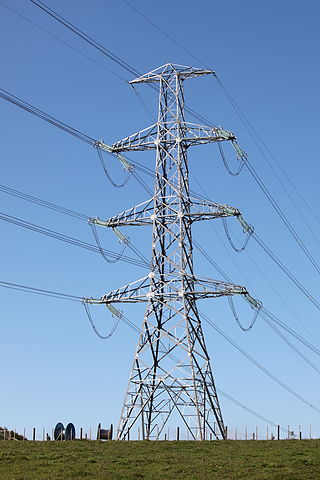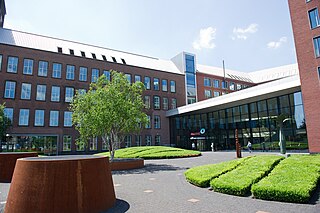In a broad sense, an electricity market is a system that facilitates the exchange of electricity-related goods and services.

The electric power industry covers the generation, transmission, distribution and sale of electric power to the general public and industry. The commercial distribution of electric power started in 1882 when electricity was produced for electric lighting. In the 1880s and 1890s, growing economic and safety concerns lead to the regulation of the industry. What was once an expensive novelty limited to the most densely populated areas, reliable and economical electric power has become an essential aspect for normal operation of all elements of developed economies.
The Open Access Same-Time Information System (OASIS), is an Internet-based system for obtaining services related to electric power transmission in North America. It is the primary means by which high-voltage transmission lines are reserved for moving wholesale quantities of electricity. The OASIS concept was originally conceived with the Energy Policy Act of 1992, and formalized in 1996 through Federal Energy Regulatory Commission (FERC) Orders 888 and 889.

A regional transmission organization (RTO) in the United States is an electric power transmission system operator (TSO) that coordinates, controls, and monitors a multi-state electric grid. The transfer of electricity between states is considered interstate commerce, and electric grids spanning multiple states are therefore regulated by the Federal Energy Regulatory Commission (FERC). The voluntary creation of RTOs was initiated by FERC Order No. 2000, issued on December 20, 1999. The purpose of the RTO is to promote economic efficiency, reliability, and non-discriminatory practices while reducing government oversight.

A transmission system operator (TSO) is an entity entrusted with transporting energy in the form of natural gas or electrical power on a national or regional level, using fixed infrastructure. The term is defined by the European Commission. The certification procedure for transmission system operators is listed in Article 10 of the Electricity and Gas Directives of 2009.
The Power Holding Company of Nigeria (PHCN), formerly the National Electric Power Authority (NEPA), was an organisation governing the use of electricity in Nigeria. During the era when it operated as NEPA, the company managed a football team, NEPA Lagos . It represented Nigeria in the West African Power Pool.
ENTSO-E, the European Network of Transmission System Operators, represents 39 electricity transmission system operators (TSOs) from 35 countries across Europe, thus extending beyond EU borders. ENTSO-E was established and given legal mandates by the EU's Third Package for the Internal energy market in 2009, which aims at further liberalising the gas and electricity markets in the EU. Ukrainian Ukrenergo will become the 40th member of the association as of 1 January 2024.
The electricity sector in Honduras has been shaped by the dominance of a vertically integrated utility; an incomplete attempt in the early 1990s to reform the sector; the increasing share of thermal generation over the past two decades; the poor financial health of the state utility Empresa Nacional de Energía Eléctrica (ENEE); the high technical and commercial losses in transmission and distribution; and the low electric coverage in rural areas

The electricity sector in Bolivia is dominated by the state-owned ENDE Corporation, although the private Bolivian Power Company is also a major producer of electricity. ENDE had been unbundled into generation, transmission and distribution and privatized in the 1990s, but most of the sector was re-nationalized in 2010 (generation) and 2012.
The electricity sector in Argentina constitutes the third largest power market in Latin America. It relies mostly on thermal generation and hydropower generation (36%). The prevailing natural gas-fired thermal generation is at risk due to the uncertainty about future gas supply.
Third party access policies require owners of natural monopoly infrastructure facilities to grant access to those facilities to parties other than their own customers, usually competitors in the provision of the relevant services, on commercial terms comparable to those that would apply in a competitive market.

Availability Based Tariff (ABT) is a frequency based pricing mechanism applicable in India for unscheduled electric power transactions. The ABT falls under electricity market mechanisms to charge and regulate power to achieve short term and long term network stability as well as incentives and dis-incentives to grid participants against deviations in committed supplies as the case may be.
The European Regulators' Group for Electricity and Gas (ERGEG) was an advisory group to the European Commission on internal energy market issues in Europe. ERGEG was set up by the European Commission to assist the commission in consolidating a single EU market for electricity and gas. ERGEG's members were the heads of the national energy regulatory authorities in the EU's 28 Member States. It was dissolved in 2011 when Agency for the Cooperation of Energy Regulators (ACER) took over its responsibilities.
The Energy Commission, abbreviated ST, was created under the Energy Commission Act 2001 as a new regulator for the energy industry in Peninsular Malaysia and Sabah. The Commission was established to ensure that the energy industry is developed in an efficient manner so that Malaysia is ready to meet the new challenges of globalisation and liberalisation, particularly in the energy supply industry.
The Single European Railway Directive 20122012/34/EU is an EU Directive that regulates railway networks in European Union law. This recast the "First Railway Directive" or "Package" from 1991, and allows open access operations on railway lines by companies other than those that own the rail infrastructure. The legislation was extended by further directives to include cross border transit of freight.

The New Brunswick System Operator (NBSO) was an independent not-for-profit statutory corporation created under New Brunswick's Electricity Act on October 1, 2004. Under the Act, the NBSO was responsible for the adequacy and reliability of the integrated electricity system, and for facilitating the development and operation of the New Brunswick Electricity Market. These responsibilities took the form of operation of the NBSO-controlled grid and administration of the Open Access Transmission Tariff (Tariff) and the New Brunswick Electricity Market Rules.
KOSTT j.s.c is a transmission system operator company with the headquarters in Pristina, Kosovo. It plays an important role in the energy sector in Kosovo. As a market operator it is responsible for the organization and administration of trades in electricity and the management of the settlement process. It is a member of the Energy Community. KOSTT is control area and It is synchronously connected with Continental Europe and cooperating with RG CE TSOs to abide by the EU packages. It expects to become a member of the European Network of Transmission System Operators for Electricity in the future.
The European Union's Third Energy Package is a legislative package for an internal gas and electricity market in the European Union. Its purpose is to further open up the gas and electricity markets in the European Union. The package was proposed by the European Commission in September 2007, and adopted by the European Parliament and the Council of the European Union in July 2009. It entered into force on 3 September 2009.

Bord Gáis Energy is a utility that supplies gas and electricity and boiler services to customers in the Republic of Ireland. Bord Gáis Energy has been in operation in some form since 1976 and supplies over 750,000 customers with energy in Ireland. Since mid-2014 Bord Gáis Energy is also part of the British Centrica plc Group. Bord Gáis Energy has offices in Dublin and Cork as well as having boiler service technicians nationwide. Bord Gáis translates as "Gas Board", although it is now a private company limited by shares and part of Centrica plc, which also owns British Gas.

Netherlands v Essent NV (2013) C‑105/12 is an EU law case relevant for UK enterprise law on electricity generation governance.








